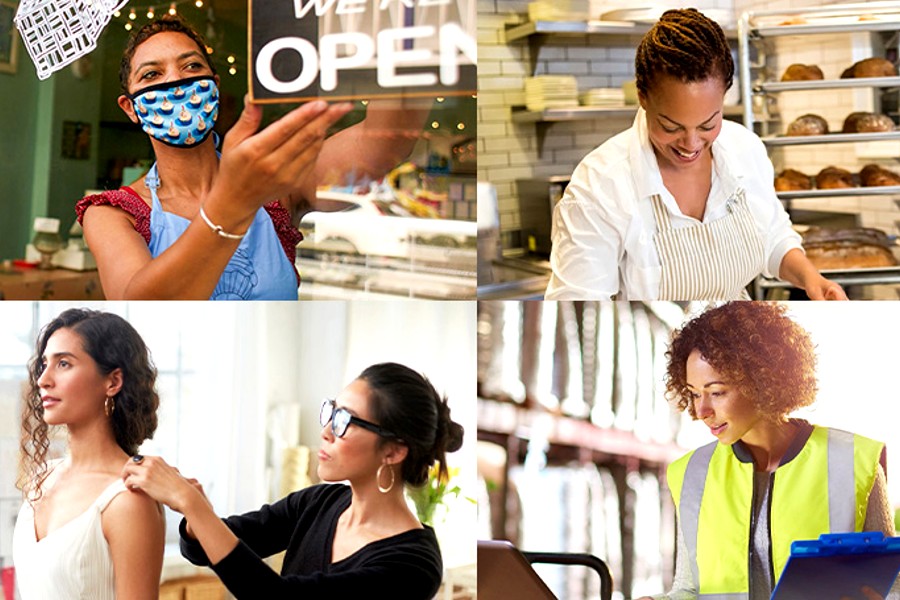
By Sandy Ramirez, Regional Banking District Senior Manager at Wells Fargo
Black/African American women are one of the fastest growing demographics of entrepreneurs in America and are key to driving small business growth.
In fact, according to the Wells Fargo 2024 Impact of Women-Owned Businesses Report, between 2019 and 2023, Black/African American women-owned businesses saw average revenues increase 32.7%, compared to 12.1% for all women-owned businesses.[1]
To offer perspective, after the 2008 financial crisis, women-owned businesses had not only recovered but had surpassed average revenue levels from before the crisis to 2008: $172,000 in 2019 compared to $151,700 before the crisis. However, this was not the case for Black/African American women-owned businesses, whose average revenue was $35,600 in 2019 compared to $40,400 prior to the crisis. Fast forward to the COVID-19 pandemic, Black/African American women-owned businesses came out stronger and now, Black/African American women business owners have outpaced growth between 2022 and 2023 in terms of employment and revenue compared to all women-owned businesses. 1
Whether starting, stabilizing, or growing businesses, Black/African American women-owned small businesses are expanding. Today more than ever, it is crucial to build wealth for the next wave of Black/African American women entrepreneurs. Supporting the future of Black/African American women-owned businesses requires focusing on key areas, such as addressing gaps in funding, growing access to capital, and providing robust mentorship opportunities.
Filling the gaps in funding
Despite starting new businesses at high proportions, many Black women and women of color obtain funding at lower rates. Research shows that women of color receive less than 0.2% of venture-capital funding.[2] Black women also encounter similar barriers in accessing capital, with about 61% self-funding their business and exhibiting a higher level of debt.[3] For example, during the COVID-19 pandemic, many Black/African American businesses experienced difficulty attaining Federal stimulus payments.[1] Furthermore, in 2020, there was a decline in Black/African American owned businesses.1
Building wealth for the next generation of Black/African American women entrepreneurs starts with building resources and growing capital for the entrepreneurs of today.
Improving access to capital
It’s important to acknowledge that access to capital remains a challenge for Black/African American women-owned businesses, even in the face of increasing revenue. According to the Wells Fargo 2024 Impact of Women-Owned Businesses Report, Black/African American women-owned businesses employ approximately 9.4 workers and generate $1,037,900 compared to all women-owned businesses, which employ approximately 8.5 workers and generate $1,602,500.[4]
While barriers to funding persist for many Black/African American women-owned small businesses, new bank and philanthropic programs are now being built to address this gap and help Black women identify capital opportunities to build sustainable small businesses. In addition to traditional lending, working with Community Development Financial Institutions (CDFIs) and Minority Depository Institutions (MDIs) can create an ecosystem of support that provides additional avenues to accessing capital. These institutions specifically work with underserved entrepreneurs including those in low-to-moderate income areas and minority populations.
Supporting these organizations and their mission was at the heart of the creation of Wells Fargo’s Open for Business Fund, an industry-leading effort that has donated roughly $420 million to support nonprofits who serve small businesses; the Small Business Resource Navigator, an online portal helping connect small business owners to potential financing options and technical assistance through CDFIs; the Capital Pathways Workbook, a free resource that helps entrepreneurs map their capital needs to business goals and objectives; and a $70 million fund in partnership with Hello Alice to improve access to credit and capital for underserved entrepreneurs.
By empowering Black/African American women-owned businesses with the financial resources they need, we enable businesses to scale, grow, and build for the future. Fostering the growth of Black/African American women-owned small businesses through improved access to capital is an investment in the long-term success of the business. By dismantling financial barriers and building an environment where businesses can thrive, generational wealth can be an attainable goal for all.
Harnessing mentorship
Investing in education and mentorship programs specifically designed for Black/African American women entrepreneurs can provide valuable resources and guidance. By addressing systemic barriers and supporting equitable opportunities, we can contribute to the sustainable growth of Black/African American women-owned small businesses, ultimately playing a part in building lasting generational wealth.
This level of support is at the heart of Milestone Circles, a mentoring program for women entrepreneurs offered by the Nasdaq Entrepreneurial Center and funded by the Wells Fargo Foundation. The majority of the participants, (86%), have been Black, African American, and/or Afro-Caribbean, and have learned to improve their business alongside a circle of fellow entrepreneurs.[5] Building strong business and community networks can significantly enhance the success and sustainability of all women-owned small businesses.
As Black/African American women continue taking the lead in business ownership, we all must continue taking steps to maintain and support their momentum. By addressing both systemic barriers and promoting proactive support, including improving access to capital and mentorship opportunities for Black/African American women-owned businesses, we can pave the way for sustained growth and build pathways for the next generation.
Sandy Ramirez
Sandy Ramirez is Regional Banking District Senior Manager at Wells Fargo. She is based in New York City. https://www.linkedin.com/in/sandy-ramirez-6ab99148/
Photo credit: Wells Fargo.
[1] 2024 Impact of Women-Owned Businesses Report, https://www.wippeducationinstitute.org/research
2 “The Comprehensive Case for Investing More VC Money in Women-Led Startups,” Harvard Business Review, September 18, 2017. https://hbr.org/2017/09/the-comprehensive-case-for-investing-more-vc-money-in-women-led-startups
3 “Who is driving Black business growth? Insights from the latest data on Black-owned businesses,” Brookings, May 24, 2023. https://www.brookings.edu/articles/who-is-driving-black-business-growth-insights-from-the-latest-data-on-black-owned-businesses/.
4 2024 Impact of Women-Owned Businesses Report, https://www.wippeducationinstitute.org/research
5 “Supporting the Wave of New Black Women Entrepreneurs,” Wells Fargo Stories, August 30, 2023. https://stories.wf.com/supporting-the-wave-of-new-black-women-entrepreneurs/.
Become a Harlem Insider!
By submitting this form, you are consenting to receive marketing emails from: Harlem World Magazine, 2521 1/2 west 42nd street, Los Angeles, CA, 90008, https://www.harlemworldmagazine.com. You can revoke your consent to receive emails at any time by using the SafeUnsubscribe® link, found at the bottom of every email. Emails are serviced by Constant Contact








